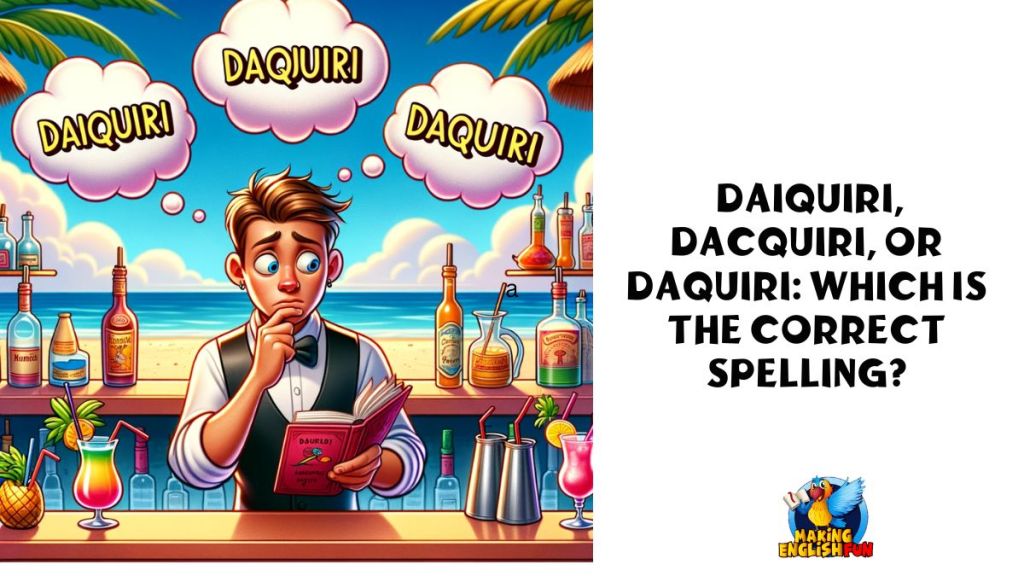Daiquiri, Dacquiri, or Daquiri: Which is the Correct Spelling?
In English, certain words, especially those borrowed from other languages, often pose spelling challenges.
The word “Daiquiri,” along with its common misspellings “Dacquiri” and “Daquiri,” is one such example. This confusion can arise due to unfamiliarity with the word’s origin and the varied attempts to spell it phonetically.
The term “Daiquiri” is widely used in culinary and drinking language and it is the name of a popular cocktail.
Correct spelling is probably not that important unless you are writing a menu, but its always useful to know how to spell what you’re drinking!

This article aims to clarify the correct spelling of “Daiquiri” and provide guidance to help you remember and use it properly in various contexts, especially those related to food and beverages.
Correct Spelling and Definition
The correct spelling is “Daiquiri.”
A Daiquiri is a cocktail typically made with rum, citrus juice (usually lime), and sugar. Originating from Cuba, this drink has gained international popularity and comes in various flavors and adaptations.
For example, “The strawberry Daiquiri is a favorite summer cocktail.”
Common Spelling Errors: Dacquiri and Daquiri
The incorrect spellings “Dacquiri” and “Daquiri” are frequent mistakes
. “Dacquiri,” with an additional ‘c,’ and “Daquiri,” lacking the ‘i’ after ‘a,’ are often the result of trying to spell the word based on its pronunciation.
However, “Daiquiri,” with its unique spelling, is the only accurate form and reflects its Cuban origin.
Comparison with Other Common Spelling Confusions
Similar to “Daiquiri,” other words also often get misspelled due to phonetic interpretations or unfamiliar origins.
Here’s a comparison table showcasing some of these challenges:
| Correct Spelling | Common Incorrect Spelling |
|---|---|
| Daiquiri | Dacquiri, Daquiri |
| Espresso | Expresso |
| Bruschetta | Bruchetta |
| Mascarpone | Marscapone |
| Quinoa | Quenoa |
This table not only reinforces the correct spelling of “Daiquiri” but also highlights the importance of learning the correct spellings of other commonly miswritten words, especially those with foreign origins.
Etymology and Historical Development
The word “Daiquiri” originates from the name of a small village near Santiago de Cuba.
The drink was supposedly invented in the early 20th century in a mine in this area. The name “Daiquiri” reflects its Cuban origin, and its spelling has remained consistent with this heritage.
Understanding the word’s origin provides insight into its unique spelling, distinguishing it from the incorrect “Dacquiri” and “Daquiri.”

Usage in Different Contexts
“Daiquiri” is predominantly used in culinary and beverage contexts, particularly in bars, restaurants, and cocktail recipes.
Its variations, like the frozen Daiquiri or fruit-flavored Daiquiris, are popular in many countries.
Correct spelling is crucial in these contexts for clarity and professionalism, especially when writing menus, recipes, or discussing cocktail options.
Tips for Remembering the Correct Spelling
To remember the correct spelling of “Daiquiri,” consider its Cuban origin and the uniqueness of its name.
Associating the drink with its exotic and tropical background can help cement the correct spelling in your memory.
Additionally, encountering the term in culinary literature, cocktail menus, and recipes will reinforce its proper spelling.
Extended Conclusion
The correct spelling of “Daiquiri” is not just a trivial detail but an important aspect of culinary literacy, especially for professionals in the food and beverage industry.
Whether you’re a bartender, a chef, or a cocktail enthusiast, using the correct spelling demonstrates attention to detail and respect for the drink’s cultural background.
Extended FAQs or Reader Questions
Q1: How does the misspelling of culinary terms like “Daiquiri” impact their perception in the food and beverage industry?
Misspelling culinary terms can affect the authenticity and professionalism perceived by customers and colleagues, potentially impacting the establishment’s reputation.
Q2: Are there any mnemonic devices to help remember the spelling of foreign culinary terms?
Mnemonic devices often involve linking the word to its origin or a unique feature. For “Daiquiri,” one might think of “Daiquiri from Cuba” to remember its unique ‘i’ before ‘r’ and double ‘i’.
Q3: Is it common for culinary terms to maintain their original spelling when integrated into English?
Yes, many culinary terms retain their original spelling to preserve their cultural and linguistic roots, adding diversity to the English culinary vocabulary.
Q4: How can one improve their spelling of diverse culinary terms?
Regular reading of culinary literature, writing recipes, and engaging in food and beverage discussions can improve spelling. Using language learning tools and apps also helps.
Q5: Do culinary schools focus on the correct spelling of dishes and ingredients like “Daiquiri”?
Culinary schools often emphasize the correct spelling and pronunciation of dishes and ingredients, as it is integral to culinary education and professional communication in the industry.







